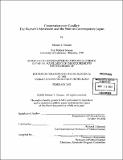Cooperation over conflict : the women's movement and the state in contemporary Japan
Author(s)
Murase, Miriam Y. (Miriam Yuko), 1967-
DownloadFull printable version (18.27Mb)
Alternative title
Women's movement and the state in contemporary Japan
Other Contributors
Massachusetts Institute of Technology. Dept. of Political Science.
Advisor
Richard J. Samules.
Terms of use
Metadata
Show full item recordAbstract
Progress on women's equality in Japan is found to be constrained by state intervention in the women's movement. This intervention takes the form of regulations that limit the independence of women's group, as well as resources that aid and influence their activities. The result is a relationship between women and the state that is more cooperative than conflictual. For this reason, social change is necessarily slow, as it is achieved through constant consultation and compromise. These findings were reached through an examination of women's organizations, women's centers, and women's policy in Japan. Data collected on 889 women's organizations shows a vibrant and diverse women's movement. But Japanese government policies make it difficult for grassroots civic groups to gain legal recognition and develop beyond part-time voluntary associations into full-time professional organizations. At the same time, the Japanese government actively intervenes to aid women's organizations by providing various resources, such as direct funding, government offices for women's policy, and public women's centers. Data collected on 623 women's centers and analysis of various women's programs show how the provision of these resources allow the government to influence the women's movement. In this way, cooperation between the state and women's movement is institutionalized, minimizing social conflict and slowing social change.
Description
Thesis (Ph. D.)--Massachusetts Institute of Technology, Dept. of Political Science, 2003. Includes bibliographical references (leaves 198-208).
Date issued
2003Department
Massachusetts Institute of Technology. Department of Political SciencePublisher
Massachusetts Institute of Technology
Keywords
Political Science.